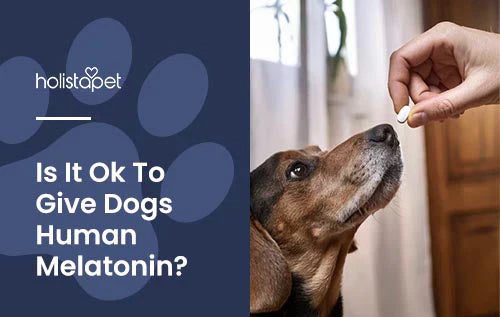"Can I give my dog human melatonin?" It's a common question pet owners ask when their furry friends have trouble sleeping. It might seem like a quick fix, but not all melatonin products are dog-friendly. To safely solve their dogs' sleep problems, owners must understand melatonin like the back of their hands.
This guide will answer your questions about giving your dog melatonin. We'll discuss the difference between human supplements and dog-safe melatonin. Plus, we'll give tips on dosing, administration, and more.

What Is Melatonin?
Melatonin is a naturally occurring hormone produced by the pineal gland in the brain. It helps regulate the sleep-wake cycle in humans and animals. Without melatonin, our sleep patterns can get messed up and lead to all sorts of trouble.
This hormone is also called the "sleep hormone." Melatonin levels rise in the evening, promoting relaxation and telling the body it's time to rest.
Melatonin has other functions, too. For example, it can help regulate mood and immune responses. It's definitely more than just a sleep aid.
Common Uses of Melatonin in Humans
Melatonin has become a go-to over-the-counter supplement for folks with sleep problems. Some common uses include:
- Improving Sleep Quality. People take melatonin supplements to help manage insomnia or sleep disturbances.
- Adjusting Sleep Cycles. It can help fight jet lag or adjust shift workers' sleep patterns.
- Supporting Well-Being. A melatonin supplement can have a calming effect, potentially enhancing mood.
Can Dogs Take Human Melatonin?
Melatonin itself is generally safe for dogs, but human formulations might not be right for canines. Giving dogs human melatonin can expose them to potentially harmful ingredients.
Consult your vet before giving your dog melatonin. They can help you pick the safest product and correct dosage for your canine companion.
Risks of Giving Dogs Human Melatonin
Giving your four-legged friend melatonin for humans comes with risks. Watch out for:
- Toxic Ingredients. Human melatonin supplements might contain harmful additives. One example is xylitol, a common sugar substitute that's toxic to dogs.
- Incorrect Dosage. Human dosages may be too high and may cause an overdose.
- Potential Side Effects. Improper dosing can lead to an upset stomach or other serious reactions.

Understanding Dog-Safe Melatonin
When you give your dog melatonin made for them, you can be more at peace. Unlike human supplements, dog products don't contain harmful additives. Dog-safe formulations promote melatonin's effectiveness without added risks.
Vets recommend melatonin for dogs as they contain the appropriate dose, taking into account the animal's weight and size. Also, melatonin for dogs comes in tasty flavors and convenient forms for easy administration.
Differences Between Human and Canine Melatonin
Human and canine melatonin supplements are pretty different. Here's a comparison:
- Toxic Ingredients. Melatonin for people may contain harmful additives. Melatonin for dogs doesn't have these dangerous substances.
- Dosage. The dosage in human products can be too high for dogs. Canine melatonin contains the proper dosage for pets, considering their smaller sizes.
- Flavoring. Canine melatonin products come in flavors and forms dogs love, making administration easy.
Potential Benefits of Melatonin for Dogs
Melatonin brings potential health benefits to our canine friends. They include:
- Regulating Sleep-Wake Cycles. Melatonin helps normalize sleeping patterns, making it easier for pets to fall asleep and stay asleep at night. Older dogs with health issues and agitated pups battling sleep disturbances could use these sleep benefits.
- Calming Effect. Melatonin's relaxing properties can help ease nervous behaviors. It's especially useful during stressful situations like thunderstorms, fireworks, or separation from their owners.
- Managing Health Conditions. Melatonin can help manage symptoms of conditions like Cushing's disease. It can also help with seasonal hair loss and other skin conditions, promoting normal hair growth.
Possible Side Effects of Melatonin in Dogs
While melatonin is generally safe for dogs, there are a few potential side effects. They include:
- Digestive Issues. After taking melatonin, some dogs may experience tummy upset, mild digestive problems, or appetite loss.
- Excessive Drowsiness. Melatonin may cause more drowsiness than expected, making your dog appear more tired.
- Opposite Reactions. In rare cases, melatonin can cause increased agitation or restlessness instead of calming your dog.
Always watch your pup after giving them melatonin. Consult your veterinarian immediately if any severe side effects occur.
What To Do if Your Dog Eats Human Melatonin?
If your dog accidentally eats human melatonin, stay calm. Inspect the label for harmful ingredients. If xylitol is present, contact your veterinarian immediately, as this can be a serious emergency.
If the melatonin does not contain toxic ingredients, watch your dog closely for any signs of tummy trouble, lethargy, or unusual behavior. It's still a good idea to talk to your vet to ensure your dog's safety.

When Should Dogs Take Melatonin?
Veterinarians prescribe melatonin for dogs who have sleep problems, particularly senior pets or those with irregular sleeping patterns. To help your furry buddy settle in for the night, give them the supplement 30 minutes before bedtime. This will give the melatonin enough time to take effect.
Melatonin also helps with anxious behaviors caused by stressors. Give your dog the supplement 30 to 60 minutes before the expected stressful event. This timeframe can ensure the calming properties kick in when needed.
Suggested Dosage Guidelines for Dogs
How much melatonin do dogs need? Veterinary medicine guidelines generally recommend a melatonin dosage of 1 mg for dogs weighing less than 10 pounds, 1.5 mg for dogs weighing between 10 and 25 pounds, and 3 mg for dogs weighing over 25 pounds.
These numbers can still vary, though. You must adjust your dog's melatonin dosage according to their size, age, and health status.
- Consulting Your Veterinarian. Before starting supplementation, chat with your vet to figure out the precise dose for your dog. Your vet can also help monitor your pup for bad reactions or drug interactions.
Choosing the Right Melatonin Product for Your Dog
Always choose melatonin supplements made specifically for dogs and free from harmful ingredients. Also, make sure the dosing is right for your dog's size and weight. Lastly, consider the supplement's form. Melatonin supplements come in various convenient forms, which we'll discuss in the next sections.
Forms of Melatonin Available for Dogs
Melatonin for dogs is available in various forms. You can choose from:
- Tablets. Tablets are a straightforward option for precise dosing. You can give them directly or hide them in your dog's food.
- Liquid. The liquid form is ideal for dogs who have difficulty swallowing pills. You can mix it with food or water.
- Soft Chews. These are good for pups who can't chew hard treats. We recommend HolistaPet's Melatonin Soft Chews for Dogs, which has a proprietary blend of calming ingredients like L-theanine, chamomile, passion flower, ashwagandha, tryptophan, valerian root, and more. They promote relaxation and support better sleep for your pet.
- Gummies. Choose melatonin gummies specifically labeled safe for canine use. These can double as yummy treats, too.
How To Administer Melatonin Safely to Dogs
Safely giving your dog melatonin involves a few careful steps. Remember the following:
- Right Product. Use a melatonin supplement for dogs or one recommended by your vet to ensure safety.
- Timing. Give your dog the supplement about 30 minutes before you need it to work.
- Monitoring. Observe your dog for any serious reactions. If you notice anything strange, contact your vet immediately.
Monitoring Your Dog After Giving Melatonin
After giving your dog melatonin, watch for any worrying symptoms. Keep an eye out for:
- Excessive Drowsiness
- Stomach Upset
- Changes in Behavior
The first few hours after administration are crucial since this is usually when side effects occur. If you notice anything concerning, see your vet for help.
Alternatives to Melatonin for Dogs
Aside from melatonin, there are other options to help with your dog's sleep issues. Consider the following:
- Try CBD Calming Products for Dogs. CBD (cannabidiol), with its calming properties, has become a popular option for promoting relaxation in dogs. HolistaPet offers CBD Oil for Dogs, CBD Dog Treats for Anxiety, andCBD Calming Chews for Dogs. We use high-quality, broad-spectrum CBD, which has no THC (tetrahydrocannabinol), the mind-altering compound in cannabis.
- Natural Remedies for Dog Anxiety and Sleep Issues. Herbal remedies like chamomile, valerian root, and passionflower also have calming properties. These can be a gentle way to help your dog settle in at night.
- Behavioral Training and Environmental Changes. Sometimes, behavioral training with experts is the answer. Creating a calm environment and a consistent bedtime routine can also make a big difference.
- Prescription Medications vs. Melatonin. In more severe cases, your vet might recommend prescription medications.
Frequently Asked Questions About Dogs and Melatonin
In this section, we'll address some of pet parents' most common concerns about melatonin. Can it help with separation anxiety? What are the signs of an overdose? We'll answer these and more, so keep reading!
Can Melatonin Help With Separation Anxiety in Dogs?
Yes, melatonin can help ease separation anxiety in dogs. By promoting relaxation, it can help manage your dog's agitation when you're away. For even better results, combine melatonin with other strategies, such as behavioral training and environmental enrichment.
What Are the Signs of a Melatonin Overdose in Dogs?
A few signs can indicate melatonin overdose in dogs. If you notice any of these symptoms, contact your vet immediately:
- Excessive Drowsiness. Your dog may appear unusually tired and uninterested in activities they usually enjoy.
- Digestive Issues. Signs like vomiting or an upset tummy can indicate an overdose.
- Disorientation or Confusion. In severe cases, your dog may seem disoriented or have trouble maintaining balance.
Is Long-Term Use of Melatonin Safe for Dogs?
Long-term melatonin use is generally considered safe for most dogs — provided it's under the guidance of a vet. When given in the correct dosage, this natural hormone can work for extended periods without causing harm. However, not all dogs are the same, so watch your pet for unwanted reactions and stay in touch with your vet.
Final Thoughts on Giving Dogs Human Melatonin
Using canine-safe melatonin is the way to go. Choosing high-quality, dog-specific products, like those from HolistaPet, can help your furry friend enjoy the calming sleep benefits of melatonin without additional risks.
As always, consult your vet before introducing new supplements to your pup's routine. With the right approach and guidance, melatonin can be a powerful tool in supporting not just your dog's sleep but also their health and happiness!







![Probiotics For Dogs [Soft Chews] - HolistaPet](http://www.holistapet.com/cdn/shop/files/Probiotic-Infographic-1_472d7a29-e30c-435a-9638-1365d8c3a9f9.jpg?v=1725384841&width=104)



























Leave a comment
All comments are moderated before being published.
This site is protected by hCaptcha and the hCaptcha Privacy Policy and Terms of Service apply.